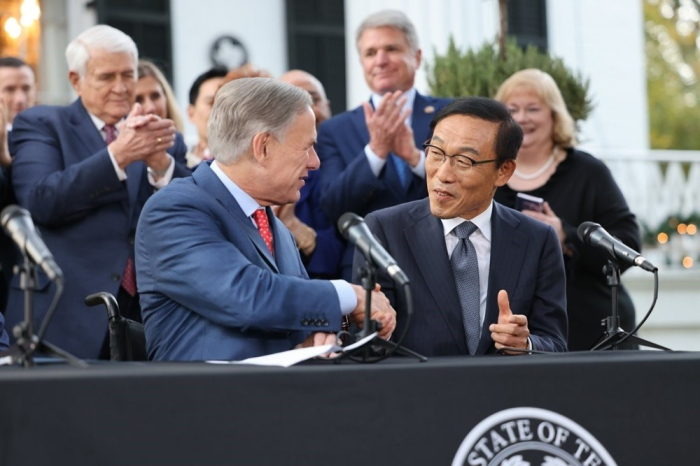Business & Politics
US finalizes $4.7 bn chip subsidy for Samsung before Trump takes office
The incentive is smaller than the previously agreed $6.4 billion as Samsung has cut investments to $37 billion from $44 billion
By Dec 22, 2024 (Gmt+09:00)
3
Min read
Most Read
LG Chem to sell water filter business to Glenwood PE for $692 million


KT&G eyes overseas M&A after rejecting activist fund's offer


Kyobo Life poised to buy Japan’s SBI Group-owned savings bank


StockX in merger talks with Naver’s online reseller Kream


Meritz backs half of ex-manager’s $210 mn hedge fund



WASHINGTON – The US finalized a $4.7 billion government subsidy for Samsung Electronics Co.'s planned microchip facilities in Texas about a month before President-elect Donald Trump takes office. Trump has criticized the outgoing Biden administration’s program to support the semiconductor industry.
The US Department of Commerce said on Friday it awarded the incentive to the world’s No. 1 memory chipmaker through direct funding under the CHIPS Incentives Program’s Funding Opportunity for Commercial Fabrication facilities.
The subsidy is smaller than a preliminarily agreed $6.4 billion after Samsung cut its investment in factory building in Taylor to $37 billion from $44 billion previously.
“With today’s award, the United States will be the only country that has manufacturing fabs from all five leading-edge semiconductor companies. The manufacture of leading-edge semiconductors is a critical part of the supply chain for advanced AI and other leading technologies,” said US National Economic Advisor Lael Brainard.
“Today’s award unleashes nearly $37 billion in manufacturing investments from Samsung, which is the only semiconductor company that is a leader in both advanced memory and advanced logic chips.”
The Biden administration has already decided to award other chipmakers — Intel Corp. up to $7.9 billion, Taiwan Semiconductor Manufacturing Co. up to $6.6 billion and Micron Technology Inc. up to $6.2 billion — under the CHIPS and Science Act, a nearly $53 billion program to encourage companies to build new chip plants in the US.
SK Hynix Inc., the world’s No. 1 high bandwidth memory (HBM) maker, secured a total incentive of $958 million, which included $458 million in direct funding and $500 million in loans.
TO MEET EVOLVING NEEDS OF AI-DRIVEN ERA
Samsung decided to increase its investment in Texas from the initial $17 billion it had pledged in 2021, to build an advanced semiconductor factory and a packaging facility in addition to the originally planned foundry plant.

“Our agreement with the US government today under the CHIPS and Science Act represents another milestone as we continue to invest and build a state-of-the-art semiconductor ecosystem in the US,” said Jun Young-hyun, vice chairman and head of the Korean tech giant's semiconductor business.
“We look forward to further collaboration with our American partners to meet the evolving needs of the upcoming AI-driven era.”
The US Commerce Department said Samsung is taking steps to strengthen US economic and national security and increase the resilience of both the domestic and global semiconductor supply chains.
The commerce agency added that the CHIPS investment would support the creation of about 12,000 construction jobs and more than 3,500 manufacturing jobs over the next five years.
“This is an extraordinary achievement, which will ensure we have a steady domestic supply of the most advanced semiconductors that are essential to AI and national security, while also creating tens of thousands of good-paying jobs and transforming communities across the country,” said US Secretary of Commerce Gina Raimondo.
UNCERTAIN FUTURE
The future of the CHIPS and Science Act, which received bipartisan support in Congress, is uncertain, however, given that Trump has blasted the legislation.
“You didn’t have to put up 10 cents,” said Trump in a recent podcast. “You tariff it so high that they will come and build their chip companies for nothing.”

Vivek Ramaswamy, who was appointed co-leader of the US Department of Government Efficiency alongside Elon Musk, criticized the Biden administration’s push to get $50 billion in chipmaking subsidies signed and awarded before President-elect Donald Trump assumes power in January.
“This is highly inappropriate: they’re accelerating spending ahead of the transition of power,” said Ramaswamy, linking to a Politico interview with Commerce Secretary Raimondo in which she discussed her remaining work to implement the CHIPS and Science Act.
Write to Sang-Eun Lee at selee@hankyung.com
Jongwoo Cheon edited this article.
More to Read
-

-
 Business & PoliticsKorean chipmakers, battery makers face new risks with Trump’s comeback
Business & PoliticsKorean chipmakers, battery makers face new risks with Trump’s comebackNov 07, 2024 (Gmt+09:00)
4 Min read -
 Korean chipmakersSamsung to more than double chip investment in Texas
Korean chipmakersSamsung to more than double chip investment in TexasApr 07, 2024 (Gmt+09:00)
2 Min read -
 Korean chipmakersSamsung’s $17 billion new chip plant in Taylor aims to rein in TSMC
Korean chipmakersSamsung’s $17 billion new chip plant in Taylor aims to rein in TSMCNov 24, 2021 (Gmt+09:00)
4 Min read
Comment 0
LOG IN


